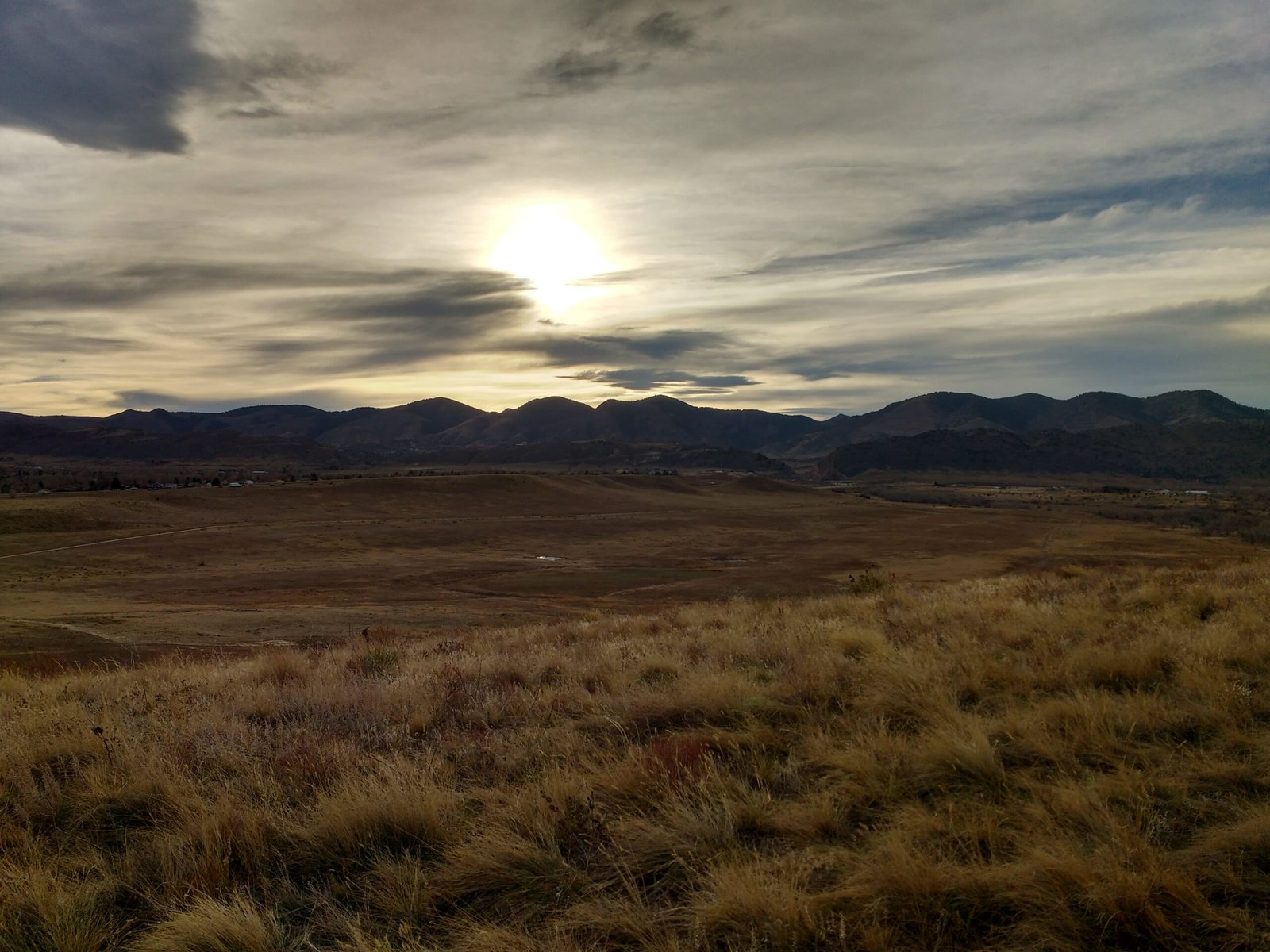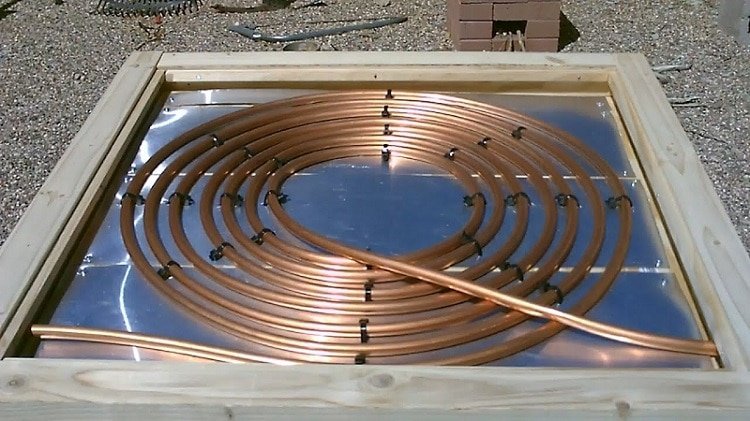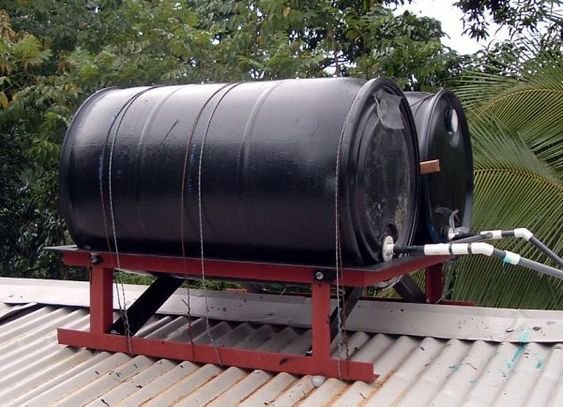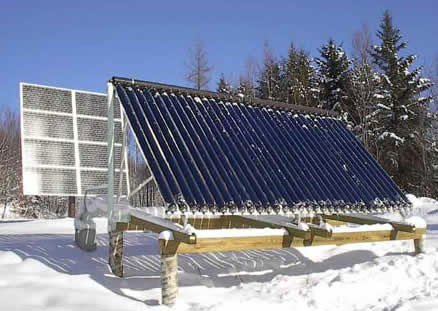Does a Solar Water Heater Work In the Winter?
The answer is technically yes. However, it depends on the type of solar hot water heating system you run and how cold your climate gets.
A passive DIY solar water heater wouldn’t stand a chance in a northern climate like Montana. On the other hand, an active prefabricated system with proper insulation or antifreeze will likely survive wintry conditions. Still, it will struggle to make the water hot enough in super cold locations.
Evacuated tube collectors work in the winter, even down to subzero temps, but must be prepped with antifreeze to keep the system plumbing from bursting.
Read on to learn more about what types of solar water heaters work through the winter, problems that may occur with your system during the winter, and how to protect your solar hot water heater from freezing.
And make sure to check out my parent article, Get the 101 on Solar Hot Water Heater Systems.
Solar Water Heater Winter Problems
There are several problems to consider when attempting to run your solar water heater through the winter.
You can also read my article about advantages and disadvantages of solar hot water heaters.
Solar Water Heater Freezing
The most apparent issue you face is your solar water heater freezing, causing damage to plumbing and fittings. As the water expands in the pipes and fittings, it could cause plumbing to burst and split.
Some locations experience freezing overnight and warmth during the day. This expansion and contraction can also cause your solar water heater to deform and malfunction.
Fewer Sunlight Hours
During the winter, we experience less sun in northern climates. Less sunlight shining down on the solar collectors means less hot water.
If you are only getting eight hours of sun and 16 hours of dark, your solar water heater will only produce up to six hours of hot water, as it takes time for the water to heat up to temp.
The speed it takes to heat the water depends on the type of solar water heater system you have. A batch collector will take much longer to heat up than a flat plate collector.

Position of the Sun
As the sun dips lower into the horizon, the high noon direct sunlight effect is weakened. As a result, weaker rays from the sun equals less heating potential for your solar water heater.
Inclement Weather
Cloudy, rainy, and snowy conditions block out sunlight which means less hot water from your system. Colder temperatures, especially combined with high winds, zap heat from solar water flat plate collectors.
Now that we know what we are up against while trying to heat water in winter, let's see how different models perform in wintry conditions.
How Different Types of Solar Water Heaters Perform In The Winter
Each type of solar water heater will react differently to cold environments. Some can handle mild freezes, while others should not be exposed to freezing temperatures at all.
Here are the most common types of solar hot water collectors and how they handle winter conditions.
Solar Water Heating Flate Plate Collector
Solar flat plate collectors consist of coiled tubing that lays flat in a frame and is encased with a glass pane. The water heats up in the tubing and circulates to a solar holding tank.
Often, you will see flat plate collectors made of copper tubing. This is an excellent choice for heating water because copper does not degrade in the sun, and it gets very hot, producing good water heating results.

However, copper does not expand or contract. Therefore the tubing is highly susceptible to splitting or bursting when the water inside of it expands and contracts due to freezing temperatures.
PEX tubing for flat plate collectors will have more ability to expand and contract with winter conditions.
However, for locations that freeze hard for several months, you will need to winterize your flat plate collector and only use it in months that stay primarily above freezing.
Solar Water Batch Collector
Batch collectors can fare better throughout the winter. Unless you are in super cold climates, like North Dakota, Canada, and Montana, it is unlikely that your batch collector will freeze solid.
However, it is not the batch collector we are worried about. All the connections, fittings, and pipes that run to and from the batch collector are vulnerable to freezing and bursting during the winter.
You can try to insulate these fittings and components, but the risk of having a system failure is high.
It also takes a good deal of time for the water to warm up in the batch collector tank. With low sunlight, cold temps, wind, and clouds, your batch collector may not get up to desirable temperatures during the winter.

Evacuated Tube Collector
The evacuated tube solar water heater is the king for weathering cold and wintry conditions. The technology used to warm up water is so efficient that your system could be pumping out hot water in subzero temps.
These are resilient to cold temps, winds, and low light conditions. However, you must protect your evacuated tube collector system from freezing by using antifreeze in the lines.
If you only have freezing temps at night, you may be able to get away from using antifreeze. But if you live in a location that experiences freezing all winter long, you must add antifreeze to your system, or your expensive solar water heater could face severe damage.
How To Keep Your Solar Water Heater From Freezing
You can try several freeze protection techniques for each type of solar hot water heater.
However, the smartest thing to do is drain your solar water heater and winterize it if you live in a really cold region.
Protecting Flat Plate Solar Collectors From Freezing
Swapping your copper tubing for PEX tubing will help deter your pipes from bursting.
Wrap any exposed PEX pipe and fittings with insulation. Then wrap that insulation with Reflectix or emergency blankets to protect the insulation from deterioration.
You can cover your flat plate collector panels with insulation sheets and Reflectix to help the system from freezing at night, then uncover the collectors during the day.
For northern climates, drain your flat plate collectors completely for winterization.
Protecting Solar Water Batch Collectors From Freezing
It is unlikely that your collector tanks will freeze solid, but they would burst, totaling your system if they did.
Protect your tanks by wrapping them in a blanket to reduce the possibility of them freezing overnight. You can also use insulation or an emergency blanket.
The main concern is all the pieces and fittings attached to your solar batch collector. Wrap these up with insulation and Reflectix, and hope for the best.
The best solution is to drain your solar batch collectors over the winter for harsh climates.
Evacuated Tube Solar Collector Freeze Protection
The only way that is guaranteed to work to protect your evacuated tube system from freezing is to replace the transfer fluid (usually water) with antifreeze.
These closed-loop systems are built-in with a glycol anti-freeze system or a drain back method specifically for freeze protection.
This solar water heater requires pumps to move the fluid through the system and is expensive to install and maintain. Using pumps costs energy and dollars to run, adding to your utility bill or solar expenditure.
The technology is the same as radiant heating, so most HVAC specialists can install and repair closed-loop evacuated tube solar collector systems.
Depending on the manufacturer of your evacuated tubes, your solar collectors could be rated to as low as -35 degrees. Check with your solar water heater installer for the best way to protect your evacuated tube system.
Or, simply drain the system and use it seasonally.

Solar Water Heater Freeze Protection in the Winter - Conclusion
As you have probably surmised by now, solar hot water heaters are not the best choice if you live in a harsh winter climate.
The risk of causing expensive damage to your system and not enough sunlight hours in the winter equals to more of a headache, if anything.
The evacuated tube collector is your best shot. It will still heat water in cold winter conditions and can stand up to subzero temps. But these systems are expensive.
A 25% green rebate is going on that can help you save money on one of these systems. You can get the rebate form here.
If you are living off grid and looking for an alternative way to heat up water, read my comprehensive Guide to Off Grid Hot Water Systems.

Hello Regina
Thank you so much for making such a great video! Our world needs more people like you 🙂
Being Indian – when I came to USA – this is one of first things which always bothered me. Why don’t they use Solar Water heaters over here???
Great to see/hear your thoughts on same.
Cheers
Girish
I am so glad you enjoyed my content and I am working on releasing so much more.
The use of solar water heaters is not as widespread in the USA as it is in some other countries, such as India, due to a number of factors, including:
Climate: Solar water heaters are most effective in areas with abundant sunlight, which may not be the case in some parts of the USA.
Cost: Solar water heaters can be expensive to install and maintain, especially for larger households.
Availability of other energy sources: The USA has a well-developed energy infrastructure, which provides easy access to natural gas, electricity, and other sources of energy for heating water.
Building codes and regulations: Building codes and regulations in the USA may not always favor the use of solar water heaters, making it more difficult to install them.
Despite these challenges, the use of solar water heaters is growing in the USA, driven by increasing concerns about energy efficiency and the environment. Some states, such as California, have implemented programs and incentives to encourage the use of solar water heaters, and many homeowners are exploring the option as a way to reduce their energy bills and carbon footprint.